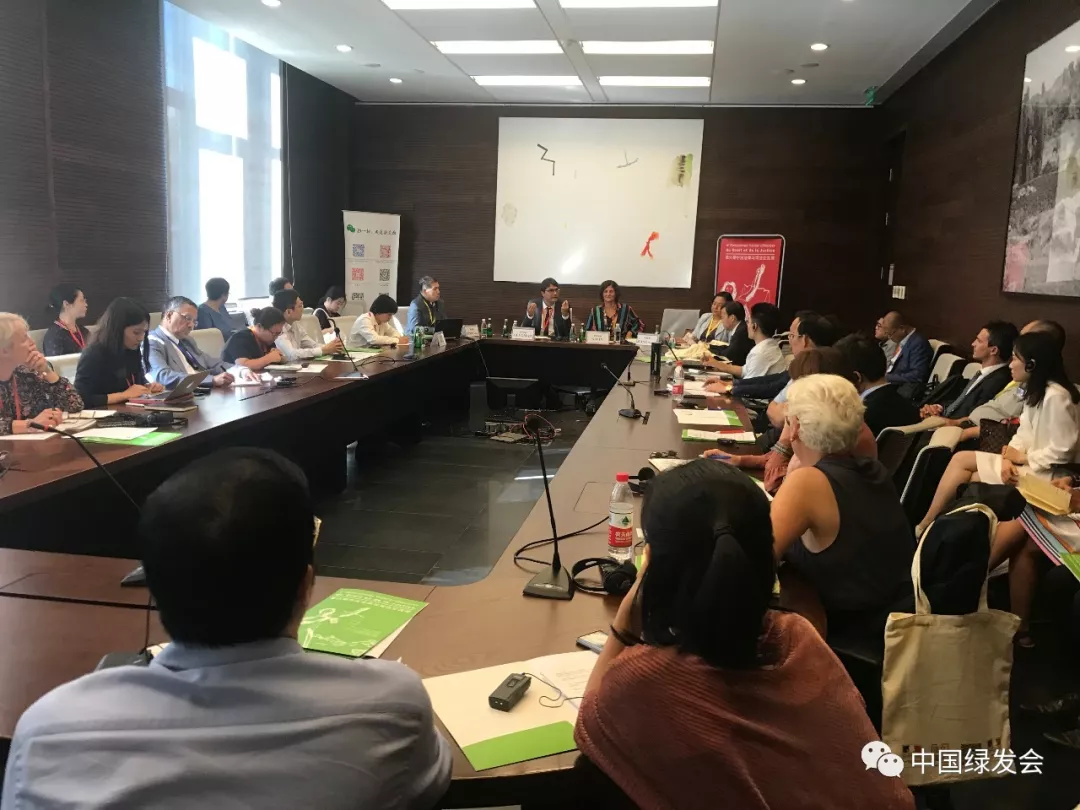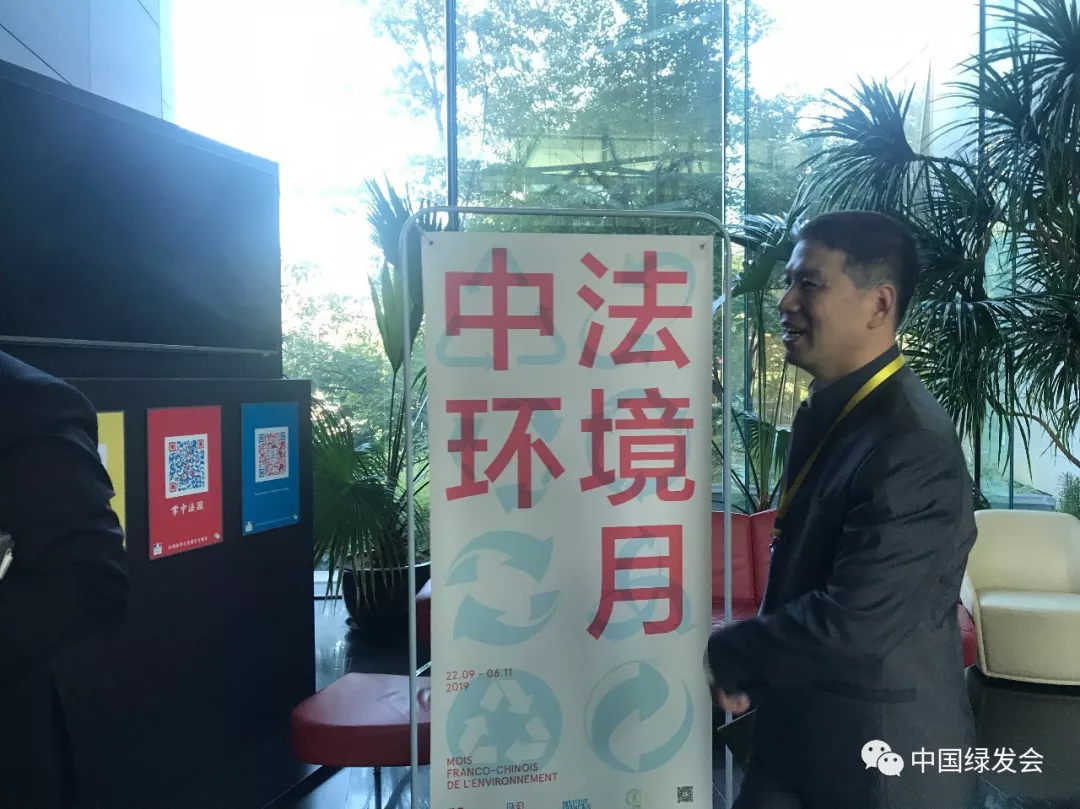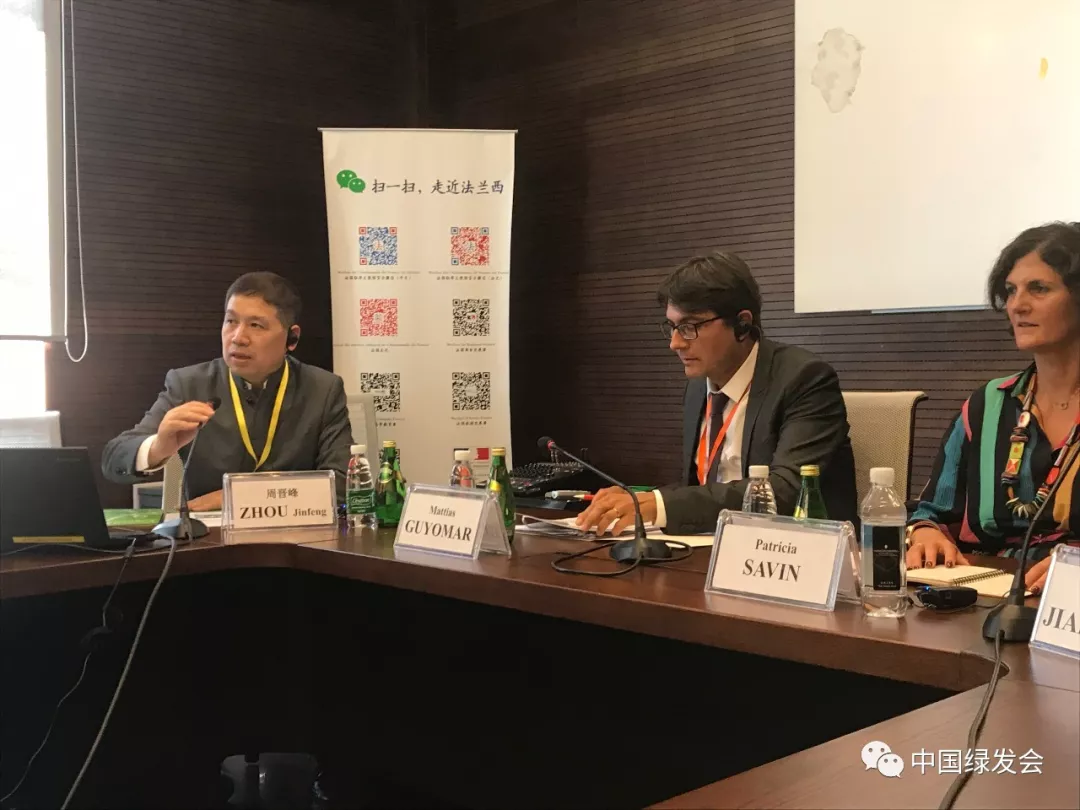On September 23rd, Dr. Zhou Jinfeng, Secretary-General of China Biodiversity Conservation and Green Development Foundation (CBCGDF), was invited to participate in the 6th Issue of Sino-French Legal and Judicial Exchange Week held at the French Embassy in Beijing and to share the theme of “Environmental Public Interest Litigation: Civil Society Promoting High-quality Development in the Era of Ecological Civilization”. This event is part of the Sino-French Environment Month in 2019, with the theme of “Building an Environmental Law to Ensure the Escort of Economy and Enterprises”. Mr. Mattias GUYOMAR, President of the 10th Court of Procedure of the Supreme Administrative Court of France, presided over the session.
Dr. Zhou Jinfeng uses four cases to talk about how China’s civil society contributes to the construction of ecological civilization and promotes high-quality development. These four cases are environmental public interest litigation of disposable tableware pollution; cases of compulsory students’ plastic book covers in primary and secondary schools; protection of endangered species of pangolin; cases of anti-electrofishing volunteers promoting the protection of marine biodiversity. The four cases show the role of Chinese civil society in environmental legislation, law popularization, law amendment, and law enforcement.
First case: There is a social organization in China called the Chongqing Green Volunteer Union (CQGVU). Two years ago, CQGVU sued six major Chinese food takeout companies, including Baidu Takeout, Meituan, Ele.me, KFC, McDonald’s, Koubei, to illustrate the important role of civil society in environmental rule of law. At the beginning of the prosecution, the courts in Shanghai and Beijing were very hesitant about whether to file the case. When they consulted the industry and Commerce Administration department, the department also thought that under the legal framework at that time, they were unwilling to file this case. The focus of the case at that time was that none of the six companies offered consumers the option of “I don’t need the disposable tableware”. Therefore, social organizations consider the enterprise’s fault and violation of the law and provide data as evidence. For example, there are at least 10 million orders a day for Meituan takeout platform. The amount of garbage generated and the cost to the environment and ecology, as well as the environmental pollution caused by the disposal of this garbage, are enormous. There were many disputes in this series of cases, which were also reported by CCTV and other media at that time. The case was finally put on file. This year, Shanghai issued local laws and regulations, one sentence of which is very consistent with that of the case at that time. The “Regulations of Shanghai Municipal Solid Waste Management” clearly stipulate that “takeout service providers and delivery service providers shall not offer disposable chopsticks, spoons, and other tableware to consumers on their initiative”.
From this case, it can be seen that the civil society lawsuit took two years to be accepted and finally became a local regulation, which has a fundamental impact on the environment. So what we as a civil society should do is to promote the rule of law according to our basic environmental laws. From the legislative link through examples to promote the rule of law.
The second case: plastic book cover. In China, I believe everyone knows that students are generally forced to use plastic book covers during every school season. How many plastic book covers will be consumed in the whole country every year? Hundreds of millions. So are these plastic book covers useful or useless? When I talked with the relevant departments the other day, I told them why the chemical plants exploded one after another. It is because there are a large number of such unreasonable and undesirable demands. If there were not so many unreasonable demands, there would not be so much pollution. Where does the haze come from? We should not create haze before we clean it up; we need to reduce haze at the source. Therefore, we proposed that students in primary and secondary schools should not be forced to use plastic book covers. If this policy is implemented, hundreds of millions of plastic book covers will be reduced in one year. Since the production and consumption of plastic book covers, as well as the waste generated after consumption and pollution to the sea, are enormous. It is very gratifying that the relevant departments have promised me that they will plan to introduce a sectoral regulation to stop this matter. Our civil society needs to discover these problems early and then finds ways to change them.
The third case is about law enforcement. For example, the ecosystem has a big problem, protecting pangolins also has a huge problem. Pangolin protection has long been a law in China, but how about the actual implementation? More than a million pangolins originally existed in mainland China, but they were on the verge of extinction under the “protection”. We tracked it for five years and only found the number of double digits. Which links have problems? It’s good to have laws, but the actual ability to enforce them is not enough. Therefore, we began to prosecute the relevant departments and to urge the implementation of the law. This is what civil society organizations should vigorously implement.
The fourth case: electro-fishing. In this regard, our country also has corresponding laws, prohibiting electro-fishing during the fishing season. However, what is the actual situation? Almost every river has illegal electro-fishing: large-scale or semi-open electro-fishing. Civil society has mobilized nearly 20,000 people all over the country who like fishing. These people love fishing, so they hate electro-fishing the most. Since electro-fishing tools can kill all the big and small fish, which make them cannot fish. These fishermen joined forces to set up the CBCGDF Anti Electro-fishing Collaboration Center (FDY). The FDY has recently been commended by the Ministry of Agriculture for its deep involvement and assistance in law enforcement by volunteers and civil society. Nor can the authorities be blamed for the rampant behavior of electro-fishing. Since there are few fishery officials, such as in Hunan: there are many rivers in a county, but there are only two or three fishery law enforcement officers. How can this be managed? Law enforcement officers can hardly cope with many illegal electro-fishing people. After mobilizing civil society, the CBCGDF’s FDY Center later also developed an App called “River Eye”.
“River Eye” can collect and monitor the illegal events of lakes and rivers and visualize the dynamic lakes and rivers information map. It allows the public to report and locate in real-time, and it can not tamper with data. The interaction between the client and the executive can link the volunteer team and the administrative law enforcement agencies. The online feedback of the report acceptance and follow-up disposal can be an effective assistant tool for the decision-making of the relevant departments. After the launch of the App, the fisheries administration also joined in. Through this platform, they can directly see who is violating the law of electro-fishing, and then they can implement precise capture. These efforts are the results of the efforts and promotion of civil society, and the results are significant. Therefore, civil society plays a very important role in promoting environmental rule of law.
Every environmental law in China now has a specific time to consult the public publicly when it is revised. During this period, the CBCGDF organized expert discussions and submitted written reports (including NPC-level, departmental-level and environmental protection departments level), and we are actively submitting opinions. Although many of these opinions have not been adopted, they also affect these departments to make continuous improvement in their follow-up work. Besides, China has two annual conferences: the Chinese People’s Political Consultative Conference and the National People's Congress (NPC) of the People's Republic of China hold important conferences every March. Therefore, before the two conferences each year, we will hold an opinion-gathering meeting to organize civil society to collect the opinions of all of us and then submit them to the legislature of China. Over the past period, remarkable results have been achieved.
Dr. Zhou Jinfeng finally said, “today I want to share a very small piece of good news with you. We learned from France. France has national legislation on biodiversity, namely the “Law on Biodiversity Restoration, Natural and Humanistic Landscape”, passed by the French Constitutional Council in August 2016, which gives us great inspiration. Therefore, we proposed to the two conferences of the CPPCC that China’s Biodiversity Protection Law should be enacted, which was supported by members of the CPPCC. It is gratifying to note that we have received a positive response from the relevant departments recently, expressing our support for the proposal to enact a biodiversity conservation law. The next step will be to research and actively promote the legislative process of the biodiversity conservation law with the relevant departments.”



(Photo credit: CBCGDF)
Original Chinese article:
http://www.cbcgdf.org/NewsShow/4937/9967.html
By / Xue Tongtong
